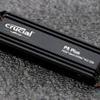Final Words & Conclusion
Final Words & Conclusion
The P5 Plus was an early adopter of PCIe Gen 4.0 support and still offers very competitive performance. This SSD, developed by Crucial, offers improved performance compared to its predecessors. It was engineered with a focus on enhancing load speeds and workflow efficiency for gamers. Although it doesn't hold the top position for speed among SSDs, it is competitively placed and incorporates various valuable features. The Crucial P5 Plus, a PCIe 4.0 x4 SSD, presents an appealing balance of price and overall high performance. The new SKU is all about a solid heatsink and of course, more refined firmware. The best thing yet is it's price though, 6 cents per GB for the 2TB (non-heatsink) version. Mind you, it does need some form of cooling, so please seat it under the motherboard heatsink. The heatsink version, btw was designed to make this unit PS5 compatible.
Endurance
We've talked about endurance previously; it's the number of times NAND cells can be written before they begin to malfunction. It is sufficient to remark that the values for QLC written (4 bits saved in a single NAND cell) are not particularly good at it. On this point, however, I always like to paraphrase Einstein: "Relativity, my man," he said. You can improve endurance by increasing the volume of your training sessions. 98 percent of your data is stored in a 'cold' state on your SSD and does nothing, and it is only the 2 percent of data that is written that is important. Volume sizes that are larger result in more NAND cells, and more NAND cells result in greater endurance. The P5 PLUS however uses TLC written NAND and our 1TB model has 600 TB written capacity, the 2TB model has a proper 1400 TB written capacity for endurance. Now, if a NAND cell fails, it does not necessarily indicate that your data is lost. Many algorithms are constantly monitoring and managing your data; for example, if a cell's lifetime is about to expire, the bits inside that cell will be relocated to a more healthy cell.
So how long does a 1200 TWB storage unit last before NAND flash cells go the way of the dodo? Well, if you are a really extreme user, you might be writing 50 GB per day (really, normal users probably won't even write that per week), but based on that value, 50GB x 365days= 18.25 TB per year written. You get 1200 TBW (for this 2TB model), so that's almost 66 years of usage and half that for the 1 TB SSD version. Let me make it very clear, 50 GB per day each day of the year is a very ambitious number.
Performance
From a purely performance-centric perspective, the P5 PLUS solid-state drive (SSD) is commendable in the market for both mainstream trace and sustained workloads. However, it's crucial to note that synthetic benchmarks, where the P5 PLUS excels significantly, can distort the overall performance landscape. While in real-world tests, this SSD continues to be highly efficient, the gap with competitors is relatively narrow. Of course it's not top of the line, but at 4-5 GB/sec reads and writes, we're savvy. Our trace testing results showcase admirable figures, with the random 4K IOPS in queues demonstrating exceptional heights. The linear performance also proves to be reliable and consistent. The SSD was capable of writing linearly to approximately 30% of its total capacity. This translates to a writing speed of approximately 4800MB/sec for an estimated continuous 325GB. So that it's more than capable for a gaming PC workload.
Concluding
The Crucial P5 Plus NVMe SSD is a slightly more advanced version of the company's pre-existing P5 range, but this model is nearly two years old (yet going very strong and affordable). It is designed to be compatible with Gen4 motherboards and intended for diverse users such as professionals, creators, gamers, and general consumers, this heatsink SKU actually can be used in a PS5 as well. The SSD includes sophisticated features like Dynamic write acceleration, adaptive heat protection, error correction code, and full-drive encryption capability. In performance terms, the Crucial P5 Plus occupies a medium ground between the top-tier PCIe Gen3 and high-end Gen4 drives, with the specific performance dependent on various factors such as workload. As a PCIe Gen 4 drive, the P5 Plus uses high-quality TLC flash memory, rather than QLC NAND flash memory, offering a cost-effective option compared to comparable products like the WD Black. Compared to Gen5 products, well, these just overheat, and for your typical workloads, perform roughly the same. It's the sad but honest truth. Despite variability in performance, the Crucial P5 Plus typically demonstrates peak sequential performance with CrystalDiskMark write speeds consistently surpassing the 5000~6000 MB/s range and read speeds reaching beyond 6600MB/s. It should be noted that the small queue depth 4K random numbers are slightly more modest. This SSD performs exceptionally well under most conditions, reaching high-end-class NVMe performance on specific workloads. Crucial provides a five-year warranty or up to the TBW value reached, whichever is first. The drive is available in three capacities: 500GB, 1TB, and 2TB.
During our testing, the P5 Plus with heatsink consistently delivered reliable performance in critical situations and ranked well among other PCIe Gen 4.0 SSDs. Its performance may slightly decline during heavy file writes when the pSLC cache is fully utilized. While most users are unlikely to notice this minor performance reduction, potential buyers should take this into account. Bottom line: the Crucial P5 Plus SSD still serves as a commendable upgrade from the P5, delivering the PCIe 4.0 improvements that users have desired. You can also grab the heatsink version, of course, 2 TB storage in that $119 range is just fabulous and proper value, NAND prices at the time of writing fluctuate quite a bit and are going down hard.
Recommended Downloads



